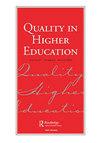高等教育质量自我评估过程:从意大利经验到通用工具
IF 1.5
Q3 EDUCATION & EDUCATIONAL RESEARCH
引用次数: 7
摘要
在高等教育领域,质量是一个多维的、横向的概念。这一点和其他考虑揭示了在将质量原则应用于学习方案时出现的一些问题,这些问题来自意大利的第一次认证经验。本文的目的是为必须实施学习计划质量的教授提供一个简单的自我评估工具,以便了解他们在认证要求方面的立场。为此,解释了创建自我评估问卷的一般程序。它由六个方面组成:(1)研究有关目标的文献或迹象;(2)创建类别和子类别的图式,(3)对子类别进行加权,(4)创建问卷,(5)创建公式,以便在毕业量表中综合问卷,最后(6)稳健性分析。因此,根据意大利的经验,详细地制定了一个完整的例子。本文章由计算机程序翻译,如有差异,请以英文原文为准。
Quality self-assessment processes in higher education: from an Italian experience to a general tool
ABSTRACT Quality is a multidimensional and transversal concept also in the field of higher education. This and other considerations revealed some problems during application of quality principles to study programmes, emerged from the first accreditation experience in Italy. The objective of this article is to provide a simple self-assessment tool for professors who have to implement study programme quality, in order to understand their position with respect to accreditation requirements. To do this, a general procedure to create the self-evaluation questionnaire is explained. It is composed of six points: (1) studying literature or indications about the objective; (2) creating a schema of categories and sub-categories, (3) weighting the sub-categories, (4) creating a questionnaire, (5) creating a formula in order to synthesise the questionnaire in a graduation scale and finally (6) robustness analysis. A full example, based on Italian experience, is therefore developed in detail.
求助全文
通过发布文献求助,成功后即可免费获取论文全文。
去求助
来源期刊

Quality in Higher Education
EDUCATION & EDUCATIONAL RESEARCH-
CiteScore
3.30
自引率
14.30%
发文量
32
期刊介绍:
Quality in Higher Education is aimed at those interested in the theory, practice and policies relating to the control, management and improvement of quality in higher education. The journal is receptive to critical, phenomenological as well as positivistic studies. The journal would like to publish more studies that use hermeneutic, semiotic, ethnographic or dialectical research as well as the more traditional studies based on quantitative surveys and in-depth interviews and focus groups. Papers that have empirical research content are particularly welcome. The editor especially wishes to encourage papers on: reported research results, especially where these assess the impact of quality assurance systems, procedures and methodologies; theoretical analyses of quality and quality initiatives in higher education; comparative evaluation and international aspects of practice and policy with a view to identifying transportable methods, systems and good practice; quality assurance and standards monitoring of transnational higher education; the nature and impact and student feedback; improvements in learning and teaching that impact on quality and standards; links between quality assurance and employability; evaluations of the impact of quality procedures at national level, backed up by research evidence.
 求助内容:
求助内容: 应助结果提醒方式:
应助结果提醒方式:


